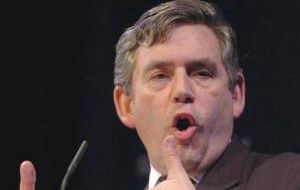MercoPress. South Atlantic News Agency
Pre G20 summit positions sees Brown line up with Bush
 PM Brown: 'Protections is the road to ruin'
PM Brown: 'Protections is the road to ruin' British Prime Minister Gordon Brown has urged leaders of the G20 developed and emerging economies to resist calls for protectionism. Speaking in New York ahead of the weekend G 20 summit on the widening global financial crisis PM Brown said protectionism was “the road to ruin”.
G20 leaders are arriving in Washington to discuss measures to contain the recent financial turmoil. They hope to agree on long-term reforms to reduce the risk of further crises. The leaders are scheduled to dine at the White House on Friday evening and hold two plenary sessions on Saturday, followed by a statement by President Bush. They hope to agree on a common set of principles for future reform, including changes to the organisations charged with regulating the world economy. Later Mr Brown told the New York-based Council on Foreign Relations that the next 20 years would see the international economy double in size - providing huge opportunities for new jobs and trade. He said the G20 - which represents 85% of the world's economy and two-thirds of its population - should look to long-term reform, rather than quick fixes. "I think what we need is a route-map to bring the economy back, so that people feel more secure about their jobs, about their homes, about the prospects for the future," he said. Mr Brown said that work to strengthen international regulation of leading financial institutions should begin before the end of the year. "Instead of just muddling through dealing with the crisis, we have to show how we are making the adjustments in the proper way to this global age," he said. Mr Brown said he believed there was scope "for further reductions in interest rates and that are an essential element of what we are doing". He also called for worldwide tax cuts and spending increases to prevent the global economy from slipping into recession. Recent figures have shown many leading economies are either heading towards recession or were in it already. US President George W Bush insisted the financial crisis was not a failure of free-market capitalism. Speaking in New York on Thursday, he said the surest way back to sustained economic growth was not to reinvent the system, but to reform it. "The answer [...] is to fix the problems we face, make the reforms we need, and move forward with the free-market principles that have delivered prosperity and hope to people all across the globe," he said. Critics say Mr Bush's words are unlikely to convince those who see the crumbling US economy as an indictment of his own policies. Meanwhile, Russian President Dmitry Medvedev has said his country and the EU could "speak with one voice" at the G20 summit hosted by President Bush. "Russia is ready, together with the EU and other partners, to participate in working out the parameters of a new financial architecture," he said. The G20 meeting will bring together both leading industrial powers such as the US, Japan and Germany, and emerging market countries such as China, India and Brazil. The heads of the World Bank, the IMF, the UN secretary-general and the chairman of the Financial Stability Forum have also been invited to attend. In an open letter to the G20 published on Thursday, UN Secretary-General Ban Ki-moon urged them to prevent the economic slowdown causing a "human tragedy" among the poor, particularly in developing countries. "If hundreds of millions of people lose their livelihoods and their hopes for the future are dashed because of a crisis they have absolutely no responsibility for, the human crisis will not remain just economic," he warned. Mr Ban said that even though more than 170 countries would not be present in Washington, he stressed "they also face grave difficulties" and that immediate action was more vital for them than reform of global financial institutions. Japan has announced it is prepared to lend up to 100 billion to the IMF to help emerging economies hit by the financial crisis. The loan offer is a part of a package of measures that Prime Minister, Taro Aso, intends to present at the G20 summit. (BBC)




Top Comments
Disclaimer & comment rulesCommenting for this story is now closed.
If you have a Facebook account, become a fan and comment on our Facebook Page!